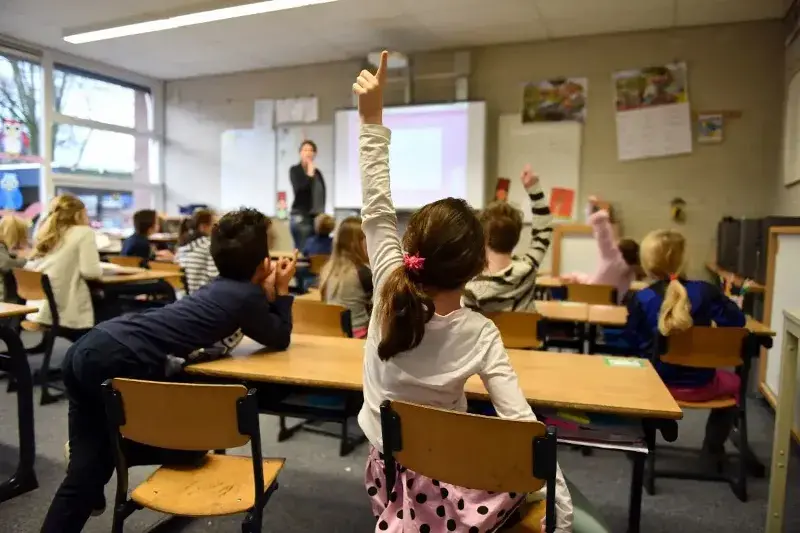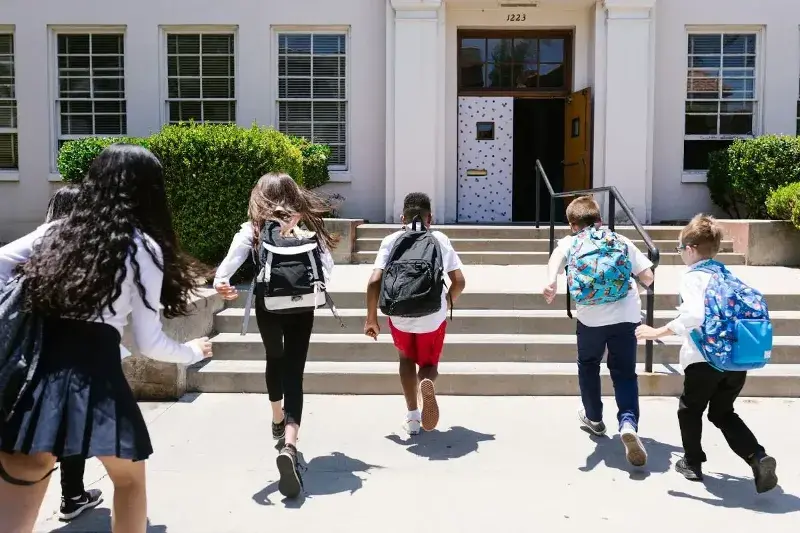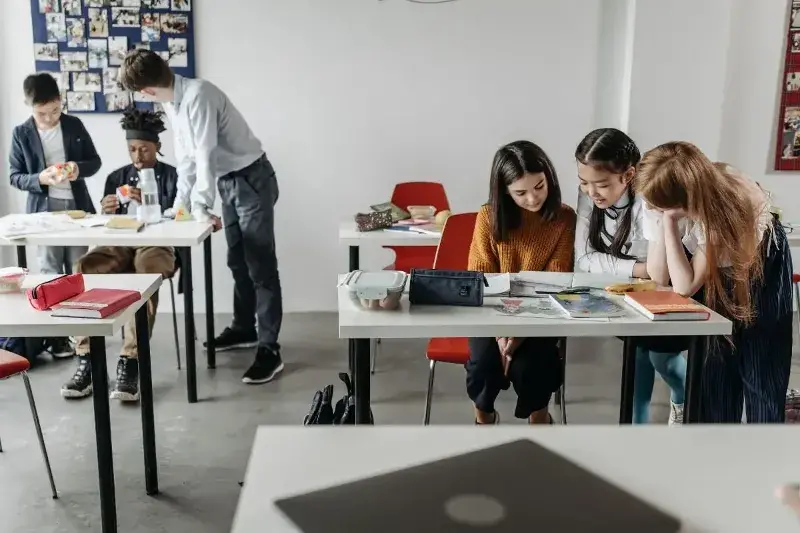How to Find a School Overseas
|
Considering the educational needs of you or your family when you are moving abroad is one of the biggest decisions you will have to consider.
I find it is often the issue that stresses families out the most when considering a move abroad. This is certainly understandable, as an international move is a big adjustment for children, and wanting to ensure that the school is a good fit is something that weighs on parents heavily.
As a mother of three, and a coach to hundreds of families navigating school choices both in their home country and abroad, I understand intimately the burden and pressure parents face when deciding on a new school.
After all, a school is where your child will end up spending the better part of their daily lives!
Due to our unique lifestyle, my children have been enrolled in just about every type of school available, in a wide variety of settings and in countries around the world.
We have attended our small local public schools where we walked every day to and from with our neighbors and friends. We have attended large international schools in foreign countries where the curriculum was taught in a foreign language. We have done home-school and world-school, as well as on-line schools and specialized schools. And more recently our oldest just started University in a foreign country.
Need support finding the right schooling option for you and your family? We have helped hundreds of expat families and digital nomads navigate school options for their kids. Reach out today for a consultation.

Each school and experience has had its pros and cons. Each setting taught us something and illuminated different parts of ourselves and others, as well as informed us about teaching styles, values and curriculum throughout the world.
Some of these schools were a good fit, while others were very much less so! Some of these schools had excellent instruction, while others not so much. In some of these schools, my children found kind and considerate children and made great friends. While all of these schools had children that were difficult to be around and below average teachers. But alas, this is real life and learning to take the good with the bad is part of growing and learning how to be in the real world.
Through every experience and school setting there are lessons learned and insights gained. There is no perfect school and you have to learn lessons both about yourself and others from all the experiences and in all the different settings…not just the good ones.
Educational Options…
The world of education is changing rapidly, so understanding the options out there is important. This is critical when you are moving abroad as you need to know what is available in your new location and community. There may be fewer or more options depending on where you are going to land and the size and location of the community you settle in. This factor alone can impact your choices significantly when deciding on the best school option for your child and your family.
So first let’s take a look at some of the more popular school options that you are likely to find all over the world.
Types of Primary and Secondary International Education Options…
Public Schools:
Public Schools: are government-funded schools that are open to all students in a particular location and religion. They follow a standardized curriculum that is set by the government.
| Pros | Cons |
| You get to know your neighbors and local community. | If you are moving to a country where there are not many expats or international students, or where the schools are not taught in your primary language, the transition can be challenging. |
| The school is taught in the primary language of your new country which means you assimilate quickly and learn the language more rapidly. | However, I have noticed while the first month or two are challenging to assimilate, by month three the kids were speaking the language and meeting many new friends. |
| It’s FREE! |
Private Schools:
Private Schools: are privately funded institutions that may offer a wide range of educational approaches, including religious, alternative, outdoor-based, arts and sciences, or another specialized curriculum.
| Pros | Cons |
| These schools often come with more specialized attention which can be good if you are new to both a community and a culture. | Private schools can keep you from meeting the kids in your neighborhood as the students likely come from all parts of a city or community. |
| Classes tend to be much smaller, and there is more one-on-one interaction between teachers and students. | Fees can be quite high in some countries. |
International Schools:
International Schools: cater to expatriates as well as local families. These schools offer a curriculum that follows international standards (e.g. International Baccalaureate) and offer a multicultural environment.
| Pros | Cons |
| These schools often come with more specialized attention which can be good if you are new to both a community and a culture. | Private schools can keep you from meeting the kids in your neighborhood as they likely come from all parts of a city or community. |
| Classes tend to be much smaller, and there is more one-on-one interaction between teachers and students. | Fees can also be quite high in some countries. |
Charter Schools:
Charter Schools: publicly funded schools that operate independently, often with a specific educational philosophy. They often have more freedom and autonomy than traditional public schools.
| Pros | Cons |
| These schools usually have more freedom throughout the curriculum. They can feel a bit more like a private school but don’t come with a high price tag. | These schools are often very small and can’t always accommodate students or offer extracurricular activities. |
Montessori and Waldorf Schools:
Montessori and Waldorf Schools: educational approaches are based on their respective philosophies. These schools often emphasize self-directed learning, creativity, and holistic education.
| Pros | Cons |
| These schools allow children to pursue their interests in arts or sciences and have a one-on-one approach to learning with smaller classes. | Not all schools are regulated for learning, and this can result in inconsistencies across curricula. The costs can also be quite high. |
Special Needs Schools
Schools that are designed for children with special needs either academically or physically. These schools offer specialized education and unique support services.
| Pros | Cons |
| These schools can offer specialized instruction, critical resources, and personal instruction based on unique needs. | These schools often don’t allow for integration or problem transitioning, as well as stigmas associated with special needs. |
Religious Schools
Schools affiliated with a specific religious institution or denomination. These schools often integrate religious teachings into the curriculum alongside the academic subjects.
| Pros | Cons |
| These schools can offer specialized instruction, and a community of like minded people. | These schools can feel small and limited to a select group of people. |
Boarding Schools
Institutions where students live and study on campus provide an environment that allows education, extracurricular activities, and social development.
| Pros | Cons |
| These schools can allow for a very active curriculum and built-in extracurricular life. They can teach independence and teamwork and prepare kids for college. | Costs of boarding schools are quite high. Additionally, they can create homesickness and disconnect between families as you don’t share in the day-to-day living. |
Home Schools
Education is provided at home by either parents or outside coaches and tutors. This type of education allows for personalized instruction and flexibility in curriculum and learning styles and methods.
| Pros | Cons |
| These schools allow for tailored learning, and studies show homeschoolers are generally more advanced academically than their traditionally schooled peers. | There is a need for parents to design and implement a curriculum which can be challenging, as well as difficulties in finding a structure or balance for work and teaching. |
On-Line Schools
Virtual schools that provide education via the Internet allow flexibility and access to a wide range of courses and resources. These schools can provide real-time lectures where students meet with a teacher or classmates or some allow for the work to be completed on a student’s own timeline.
| Pros | Cons |
| Online school can be a welcome alternative to homeschooling as the curriculum is provided and access to instruction and teachers is built in. It also allows for flexibility around schedules. | These schools often require a lot of screen time and limited social interaction. |
World Schooling
Schooling where there is no formal curriculum and families use the day-to-day life, travel, and natural curiosities of their children to lead the way in education and exploration.
| Pros | Cons |
| Worldschooling allows children to go beyond the curriculum, learn from their environment, and pursue their own interests. It allows for tremendous flexibility to travel and learn from their environment. | This model can keep children away from regular routines and friendships or extracurricular activities. |
Alternative Schools
Schools that follow a non-traditional educational approach such as democratic schools, arts and music, and entrepreneur academies.
| Pros | Cons |
| These schools allow children to pursue their interests in arts or sciences and have a one-on-one approach to learning with smaller classes. | Not all schools are regulated for learning, and this can result in inconsistencies across curricula. The costs can also be quite high. |
As you can see there are so many options now for schooling all over the world. Some countries and locations might have dozens of options while others only have their local public schools.
Where you decide to move will have a big influence on how many options are available. If you are moving to a location that has a lot of expats and a large international population you will have many choices, while on the other hand smaller communities will likely only have their public school option.
Things to Consider When Picking a New School…

- School culture and how it suits your family and child: Understanding your child is critical. Do they like a larger environment or do they prefer smaller, one-on-one classes and attention? Do they want to be in a rigorous academic setting or do they prefer arts and sciences and a plaid back school structure? Make sure the curriculum suits your child and their inclination.
- Extracurricular activities: These can play a big role in your child’s happiness at school. Some schools offer a wide variety of after-school activities ranging from chess and legos to karate and tennis. Many kids look forward to attending school for these activities alone. Understanding what is available and if your child is interested is important.
- Cost: Tuition can range dramatically from free to thousands of dollars a year. Making sure to not place a burden on yourself if the tuition is exorbitant is important. Many schools offer assistance, so be sure to look for aid if available and appropriate.
A Few Things to Remember when choosing a school abroad for your child…

Challenge is to Be Expected: If you have moved across the globe and are starting a new school it is inevitable that your child will face some tough days and challenges as they begin the journey in their new school. Remember that some challenges, as long as there is considerable family support, are beneficial for kids. It gives them a sense of confidence that they can start new things and overcome obstacles. So do not run from, or panic if your child faces some difficulties. Moving schools and starting a new life abroad comes with growing pains!
That being said, too much challenge or unhappiness is not acceptable for developing children, and it is up to the parent to know what that level is. Chronic stress or unhappiness has long-term implications for a developing child, so make sure you are paying attention to the level and duration of stress.
It’s ok to change schools: I am always perplexed when parents don´t see changing schools as an option. While it is important to give a school a chance and wait for the dust to settle a bit when starting in a new location, it is also a really helpful life skill to know when it is time to go somewhere else! There are so many options in school nowadays and finding a better fit in a school can radically change the trajectory of your child’s life. While you don´t want to quit at the first sign of stress, deciding to pivot can be a very good decision if it is done with thought and consideration. Just like you would not encourage a partner or friend to stay in a toxic job that did not suit them, the same goes for finding a school that is a better fit for your child.
Relax: The amount of pressure and stress I see parents exhibit when it comes to their kids’ schooling is often quite shocking. We have been made to believe that school dictates the rest of our children’s lives and we end up losing site of what is important and that is the overall long-term well-being of the child. The home environment and relationship with their parents far outweigh the influence of any school. So check yourself when it comes to overburdening your child with your anxiety around school and their performance. Understand your fears and apprehensions before you misplace them and impose them on your child.
Finally…
Moving abroad is the best thing you will ever do! It will give your child a worldview and life skills that they can not get by staying in their comfortable and predictable environment. Moving abroad will be an invaluable education in itself for your children. When it comes to choosing a school abroad, ease up on the pressure and emphasis you put on its importance, for both your sake and that of your child. You will all benefit from this shift in perspective and have a much more educational, happy, and positive experience!
On a Personal Note…
As a mom and a psychologist, I have come to appreciate just how unique each child is. As a result, I have had to think individually about each of my children and their needs.
Our oldest preferred a rigorous academic environment and thrived in a challenging school with other very academic children. We did not push this, but followed her lead the way and it proved to be a life-changing decision where she found her tribe of peers and her passion.
Our middle child is much more artistic and intuitive and has thrived in a home-schooling environment where she gets to focus on the things she likes best such as art and sewing. She stays very active in outdoor activities with friends after school such as surfing, tennis, and horseback riding.
And our youngest prefers world school. He is endlessly intrigued by the world around him and will pursue his passions and interests on his own without a curriculum. He has taught himself coding and mechanics, as well as surfboard shaping and guitar all by being allowed to follow his passions.
Listening, observing, and truly trying to understand what best serves your child as opposed to imposing what a system thinks is best for them is a game changer when it comes to helping your child develop into the best version of themselves. So keep an open mind and heart as you navigate school and the path forward for your child.
We get one shot at this and it is over quickly!
All three of our kids would not change trying different schools and moving abroad for anything! Despite the challenges they said it has been the best thing they have ever done. Read here about our 15 year olds experience at a new school in Spain. And here about our 16 year olds transition to a new country as a teenager.

Our three kids have attended every type of school from On-line to Private and International. And each one prefers a different type of school!

Get Started Today!
How to Move Abroad
A Workbook to help you make the right choices
Use our easy to follow roadmap to help you find the perfect location to start your new life.
Hello and Welcome!

We started our family travel blog in hopes of supporting other families move abroad and travel the world. Through straightforward, sincere and supportive information we hope to provide a reliable guide for those moving overseas with a family and traveling the globe.





